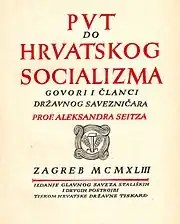Croatian socialism
Croatian socialism (Croatian: Hrvatski socijalizam) was the name for the foundations of the social-economic ideology that the Ustaša movement in the Independent State of Croatia began to build during the Second World War. The Pavelić regime produced extensive literature about the organization, economic and political that the new Croatian state would follow, concluding to adopt a purely Croatian socialism, strongly inspired by German National Socialism, based on class collaboration for the common benefit and ethnic nationalism. The authorities argued that the so-called "Croatian socialism" was the appropriate model for the nature of the Croatian people, which throughout its history had been characterized by its community, solidarity and cooperative spirit and by its worker-peasant structure. The foundations of self-governing socialism as a system of self-governing interest communities were theoretically already elaborated in the Independent State in the works of the philosopher Stjepan Zimmermann, the philosopher and indologist Čedomil Veljačić, the sociologist and ethnologist Mirko Kus Nikolajev, as well as the syndicalist Aleksandar Seitz.[1][2]

See also
References
- : Ustaški put u socijalizam : U teoriji i praksi NDH : Zbirka rasprava i članaka nikad objavljenih poslije 1945 (in Croatian).
- Kolanović, Nada Kisić (2011). "Komunizam u percepciji hrvatske nacionalističke inteligencije 1938.–1945".